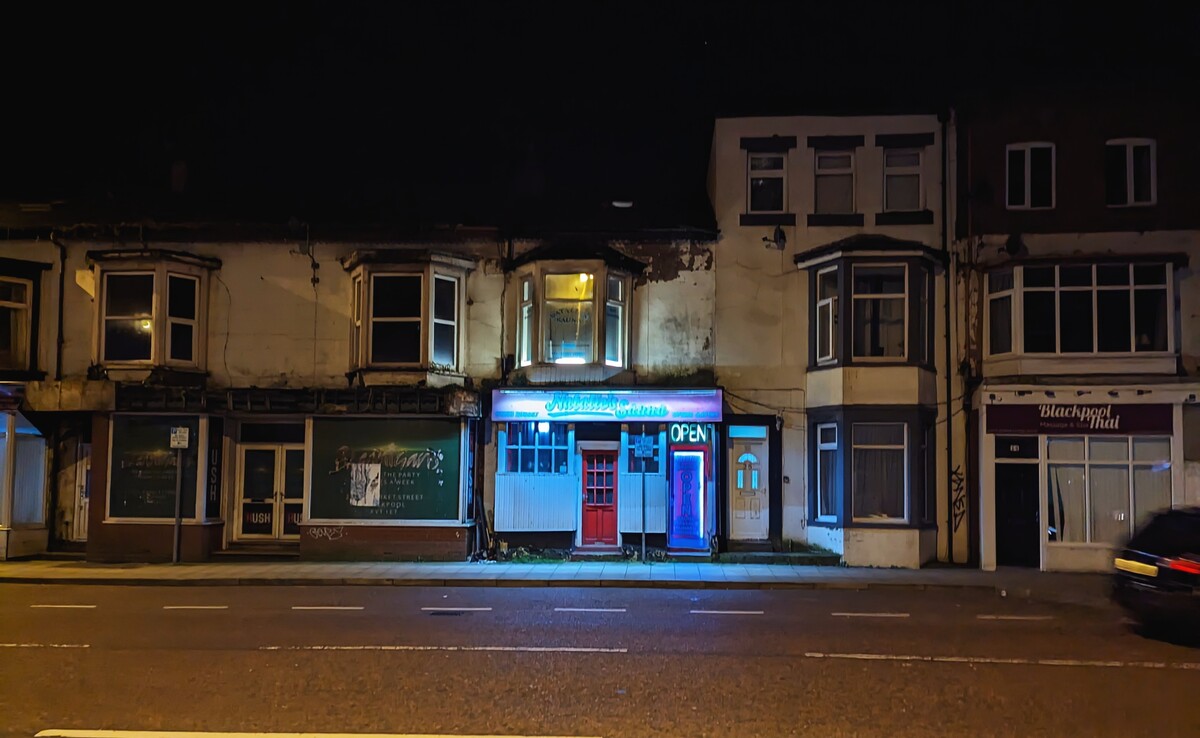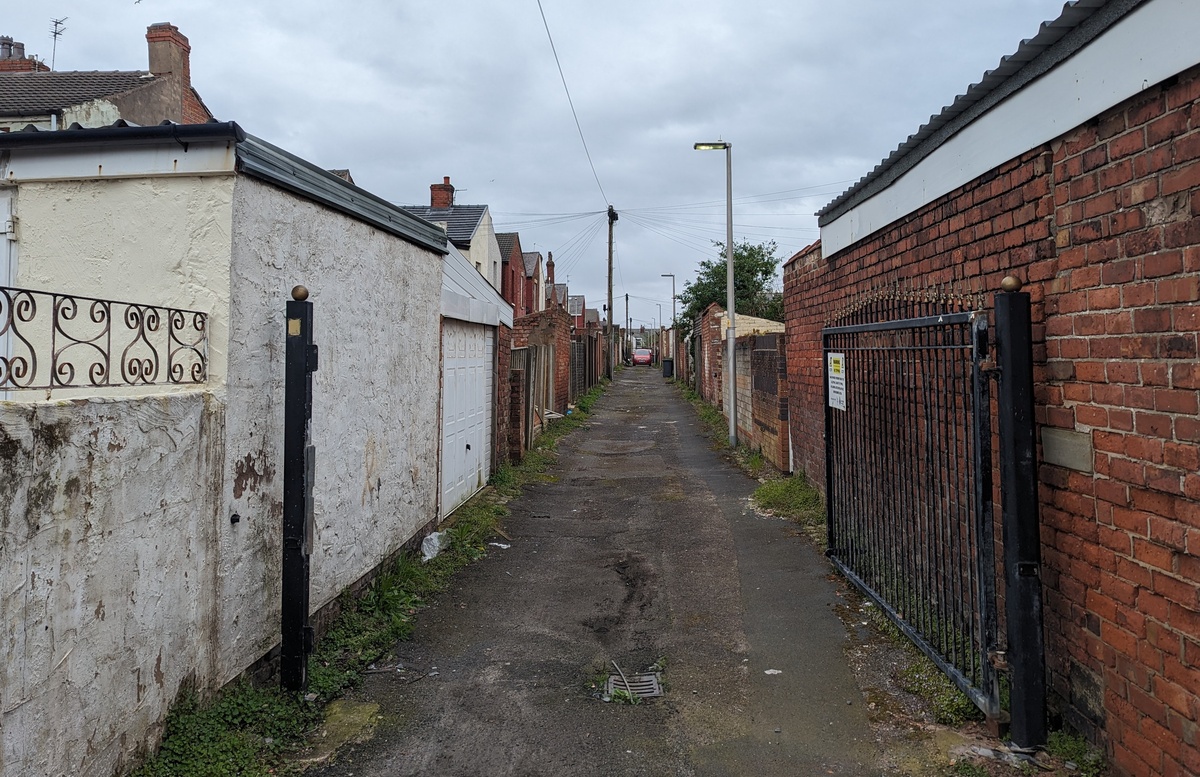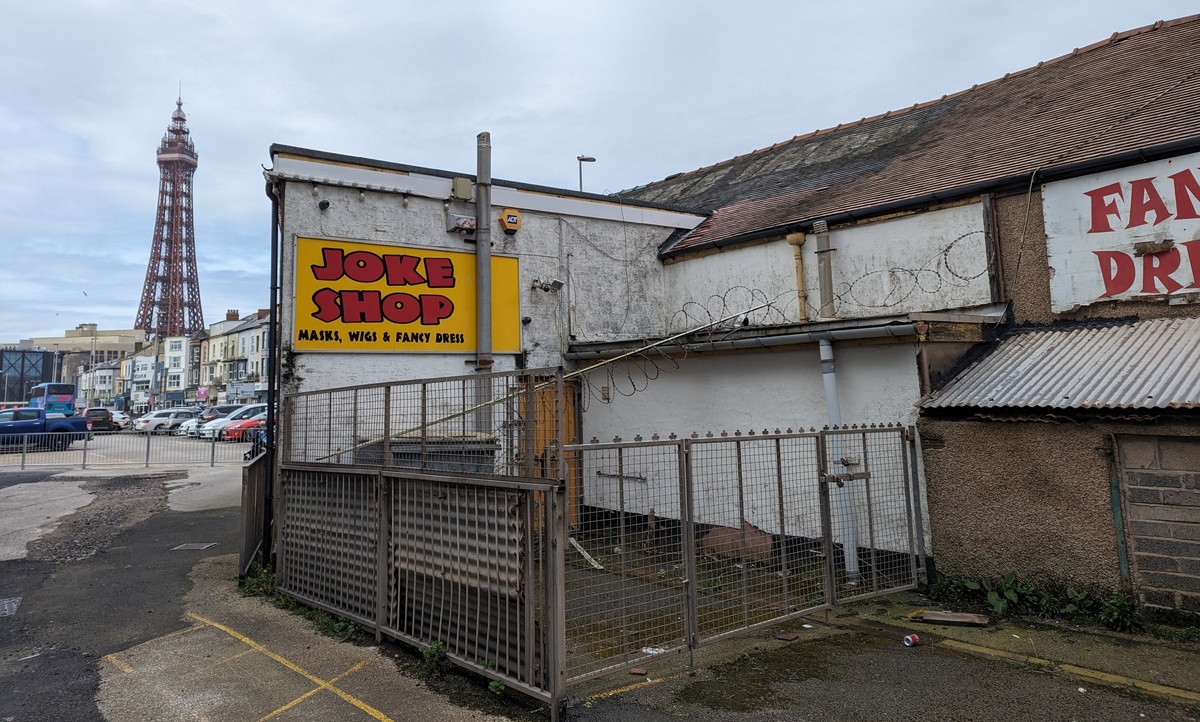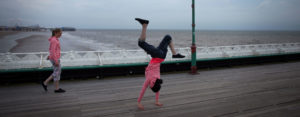Every online review for one of Blackpool’s brothels tells a sordid story. “I plan to visit nightly,” writes a punter whose wife has just died. “A depressing hovel,” claims another who took a teddy bear with him. A third admits he was too drunk “to make full use”, but plans to return.
The first time I visit Cookson Street, it is Saturday morning and, despite its reputation, there are no red lights: just a string of boarded-up shops and a building site at the end of the road. A new “Civil Service Hub” for 3,000 relocated government workers is nearing completion. Around the corner, a Royal British Legion club stands opposite a gay sauna. Which, I wonder, will the civil servants prefer?
Only one brothel is open and a car loiters outside. The driver leans over a baby in a car seat, watching the door. Is he waiting to go in, or for someone to come out? He drives off before I can ask.
The second time I visit Cookson Street, the groan of revellers near the North Pier lingers on the wind. Natalie’s is flanked by darkness; her LED lights in neon contrast with the squalid buildings on either side. Fluorescent blue picks out her pink door. I press the buzzer.

A lingeried woman, perhaps in her late-20s, appears at the door. She smiles vacantly, and guides me into a waiting room. The walls are crimson; the leather sofa is black; a vending machine vibrates in the corner, selling chocolate bars and crisps. “We do not tolerate harassment,” reads a poster, provided by the police. A CCTV camera flashes. There is a faint scent of hand sanitiser.
“Have you been here before?” the woman asks, before reeling off her prices. “It’s £40 for hand relief: £50 for topless hand relief; £60 for oral or sex; or it’s £70 for all three. And that’s for half an hour.” She summons two younger women from a backroom. They shuffle in nervously, introduce themselves in Lancashire accents, and ask me to choose.
I decline and explain I want to talk about their business, the punters, and whether the brothel — technically illegal in the UK — had been approved by the police. “NO,” a woman shouts from the backroom. “He needs to ask Joanne.” The two younger women quickly disappear; the third passes me a phone number.
Joanne Andrew has run a brothel out of 27 Cookson Street since at least 2010, when she was caught advertising it as a “beauty salon” on the local council’s website. As punishment, the council removed the listing, but the punters kept returning. For six years, they came and went — until a police raid discovered a 16-year-old runaway from Manchester hiding half-naked under a blanket. Pulled up in court and facing a closure order, Andrew apologised for not knowing the girl’s age: it was a “one-off mistake”, she told a judge. It wouldn’t happen again. She claimed she had a mortgage to pay, and worried what would happen to her “girls” if the brothel closed. This satisfied the judge who allowed Natalie’s to remain open. Since then, the police have carried out regular inspections, the most recent taking place earlier this year.
When I asked Lancashire Police about this visit, they — like Andrews — refused to comment. And who can blame them? Far easier to stay quiet — to accept that Blackpool’s vice and politics are too entwined to untangle. Far easier to pretend the underworld doesn’t exist.
Last year, it was revealed that 105 serving police officers were under investigation for corruption; this year, it was the turn of Blackpool’s representatives in Westminster. In Blackpool North, the MP stands accused of misusing taxpayers’ money, while his colleague in Fylde allegedly paid a teenage escort for sex and later used campaign funds to pay off “bad people” who had locked him in a flat. For now at least, neither has fallen as far as the MP for Blackpool South: in March, Scott Benton was forced to stand down after agreeing to lobby ministers in return for money from journalists posing as gambling industry investors.
There’s a by-election next month, but few believe change will follow: every year or so, political betrayal washes up on Blackpool’s shores, and lies there ignored. Three decades ago, Tony Blair chose the resort’s Winter Gardens as the demolition site of Clause IV, his party’s commitment to socialism, and in return promised to build an opulent supercasino; but the project was moved to Manchester, and finally binned. Then, 15 years later, Boris Johnson came to town and promised to Level It Up. The Government claims the resort has received more than £100 million of funding since 2019. But how did they spend it?
Today, eight of the country’s 10 most deprived council wards are in Blackpool. And on all counts, the southern ward of Bloomfield tops the list: 40% of children live in poverty here, 25% of adults are on out-of-work benefits, and nearly 20% suffer from GP-diagnosed depression. It is a petri dish for political negligence. There are no by-election placards; just the resigned and despairing.

Jimmy, David and Dylan are no exception. Perched outside a crumbling house on a crumbling street, a 10-minute walk from Blackpool’s South Pier, the trio of oversized urchins are smoking a “biff”.
“Do you want to see the seedy drug side or the seedy sex side?” Jimmy asks. He’s the eldest of the three, probably in his early-30s, and boasts that he knows all the “rough places”. He tells me, too, that “nobody messes” with his brother, while his nephew is on the run in Dubai and “looking at 30 years”.
Jimmy’s eyes flicker as he describes his own predicament. “I’ve got a problem with this bloke, Robert,” he says. “And I’m going to have to have it with him.” But Robert won’t fight “man-to-man” with his fists. “He’s driving about on one of those electric bikes with a bottle of acid for me. Do you know why he wants to do that?” Jimmy answers his own question. “Because he’s a soft cunt.”
On cue, a car screeches wildly down the road and skids to a halt on the pavement next to us. Jimmy’s smile has disappeared; his torso has tensed. He looks terrified.
“Look here you maggot,” the driver is livid. “What have you been saying about me?” Jimmy tries to dart around the car but is cut off. “You’ve been saying to people that you’re going to kill me,” the driver yells, reaching to get out. But Jimmy has disappeared down an alleyway — and the man can only fire off insults: “You’re a MUPPET. You’re a fucking muppet.” He turns to a teenager who has emerged from a nearby house. “Tell me where he lives,” he demands, speeding off as soon as the boy replies.
With Jimmy gone, the younger pair open up. David is 20; Dylan is 18. Both deal drugs and both are homeless. They have black rings around their eyes, filth under their fingernails, and the wispy moustaches of young men unable to grow a full beard. Occasionally, they admit, they rob tourists at knife-point.
David was “kicked out of care” when he was 18, and had nowhere to go. He worked as a roofer for a bit, living on-site, but then the jobs dried up. “I’m selling weed right now to get some peas on the table.” On a good day, he’ll make around £70 — enough to pay for a twin room in a mouldering backstreet hotel. On a bad day, the pair spend the night wandering the streets, bitter gusts off the Irish Sea making sleep impossible.
Dylan was 16 when he was kicked out by his mother, and doesn’t know why. He lived on a friend’s sofa for a few months, and was passed between family-members. But eventually they tired of him, and he knew couldn’t go home. “My brother is a paedo,” he says matter-of-factly. “He’s been done for it… If I go near that gaff, that’ll be me done. I know I’ll just go for him.”
When they’re not dealing, the boys — they’re still boys — hang out on the resort’s Central Pier, where a security guard brings them food and lets them charge their phones. Sometimes they smoke a “biff”; other times they glare at tourists. Both claim to have girlfriends who don’t know they’re homeless. “They just think we sell a bit of weed,” Dylan says. David starts to tell me about his last girlfriend who had two miscarriages, before catching himself. “It’s just one of those things,” he shrugs.
By contrast, they seem to feed giddily off the violence they see. “A few months ago, I saw someone get run over, stabbed, and then run over again,” Dylan says. David interrupts: “I’ve seen someone with their intestines hanging out.” He then pulls up his jacket to reveal scars down his arms. He first got stabbed when he was in care, he explains. Not to be outdone, Dylan lifts his shirt proudly: his pale stomach is pockmarked by knife wounds.
“We’ve all seen shit,” Dylan adds. “We’ve all been forced to live through it… I watched one of my friends kill himself.” The friend, inconsolable after an argument with his mother, was on FaceTime to Dylan when he pulled out a knife and plunged it into his chest. Dylan sprinted to his house, but arrived too late. A coroner blamed “unmanaged ADHD”. The boy was 15.
A few hundred metres away, up towards the promenade, Martin is sitting in his toy shop. Surrounded by puzzles and dolls and brightly coloured beach balls, he is unforgiving of Blackpool’s young criminals. Just three weeks after the store opened, a group of teenagers smashed through its windows and ran off with its contents. Every now and then, one will return. Today, the shop is empty. It’s been a slow start to the year, he explains.
Martin dismisses those who claim it’s hard to find a job in Blackpool. “If you want work, you just need to ask around,” he says. “There’s always a job somewhere.” The problem, according to everyone I speak to, is that crime has anchored itself in Blackpool — and few can escape it. Martin describes how a nearby flat was colonised by dealers and turned into a drug den. Just a few weeks ago, somebody was killed around the corner: he says a heroin addict went to attack her boyfriend with a knife, who then took it off her and stabbed her 18 times.
A few doors down from where the attack took place, Jenny is having a cigarette on her porch. She claims a prying neighbour spotted a wall caked in blood, but isn’t sure she believes it: “Surely it would’ve been reported in the papers?”

Born in Huddersfield and now in her 50s, Jenny has worked behind almost every bar in Blackpool, but is currently unemployed. She suffers from spinal degeneration, pulmonary disease, bipolar disorder and anxiety. “There’s nothing rare about that here,” she adds. “Everyone has a story behind it though.”
And hers? “My dad was a Glaswegian gangster and one of Britain’s longest-serving prisoners, and my step-dad beat the seven bells out of me.” She breezily describes her father’s downfall: “He killed a child molester and then they put him in a prison full of child molesters. So he went ahead and killed a few more…”
For Jenny, moving to Blackpool provided an escape and a livelihood for her and her children. But it was a limited one. She points to Central Drive to chart the resort’s decline. It used to be the proud backbone of Blackpool. Today, it is an assortment of derelict buildings, its main attraction — a joke shop from the Seventies — finally collapsing in December.
Eastern European gangs now operate out of the creaking houses, selling drugs and trafficked women on soiled mattresses. A Romanian newsagent stands accused of trying to solicit schoolgirls. Jenny tells me how a bunch of local lads went down to “kick the shit out of them”.
When I visit at night, lights flicker behind torn blackout curtains. A few young men skulk up the street and into a disintegrating building. Just the sort of place where a 16-year-old runaway could be hidden; or a young man stabbed; or an MP held ransom. A patrol car turns on to the road, and then off again. “Everyone knows about what’s going on,” a neighbour says. “But the police do nothing.” Some residents blame their councillors, others their MP. All are resigned to the fact that nobody will step in. “It feels like they’re letting the Romanies and Romanians take over,” says one woman.
Back on the promenade, a Romany disagrees. Jade claims to read hundreds of palms each week, but, like every business owner here, has to contend with thieving gangs and delinquents. They descend in balaclavas during the day, many as young as 11. “You can’t do anything because they’re underage,” she adds.
Vice is written into Blackpool’s stars, Jade says. And then dragged down to earth: to the brothels and backrooms, to the drug dens and open streets. For decades, politicians offered platitudes and promises — and look at what they delivered: a party town thrown into the abyss. “People just don’t have enough money,” she sighs. “Businesses are closing and there’s more homeless on the streets. It all adds to this restless atmosphere.”
She’ll always have her regulars, though. Even in turmoil, people want to have their palms read; to be told that they matter, that they have a future. As if to prove her point, a woman sticks her head through the curtain and demands a reading. “Just don’t tell me if I’m going to die,” she pleads.
The fortune-teller laughs. “But of course you are.”
***
Some names have been changed.
Disclaimer
Some of the posts we share are controversial and we do not necessarily agree with them in the whole extend. Sometimes we agree with the content or part of it but we do not agree with the narration or language. Nevertheless we find them somehow interesting, valuable and/or informative or we share them, because we strongly believe in freedom of speech, free press and journalism. We strongly encourage you to have a critical approach to all the content, do your own research and analysis to build your own opinion.
We would be glad to have your feedback.
Source: UnHerd Read the original article here: https://unherd.com/



